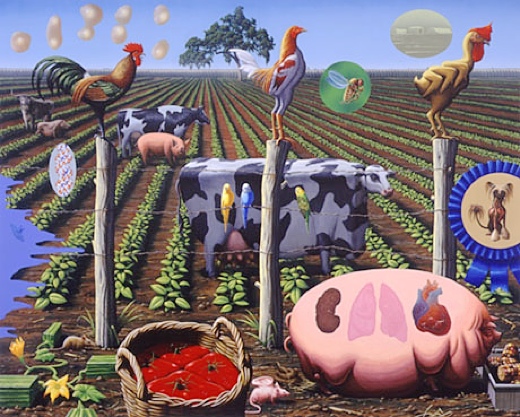SUBHEAD: How to avoid foods made with genetically modified organisms (GMOs)
available online at: Institute for Responsible Technology, www.responsibletechnology.org

Non-GMO Shopping Guide is designed to help reclaim your right to know about the foods you are buying, and help you find and avoid GMO foods and ingredients. Tips for avoiding GM crops
TIP #1: BUY ORGANIC Certified organic products are not allowed to contain any GMOs. Therefore, when you purchase products labeled “100% organic,” “organic,” or “made with organic ingredients,” all ingredients in these products are not allowed to be produced from GMOs. For example, products labeled as “made with organic ingredients” only require 70% of the ingredients to be organic, but 100% must be non-GMO.
TIP #2: LOOK FOR“NON-GMO” LABELS Companies may voluntarily label products as “non-GMO.” Some labels state “non-GMO” while others spell out “Made Without Genetically Modified Ingredients.” Some products limit their claim to only one particular “At-Risk” ingredient such as soy lecithin, listing it as “non-GMO.”
TIP #3: AVOID AT-RISK INGREDIENTS Avoid products made with any of the crops that are GM. Most GM ingredients are products made from the “Big Four:” corn, soybeans, canola, and cottonseed, used in processed foods. Some of the most common genetically engineered Big Four ingredients in processed foods are:
Corn Corn flour, meal, oil, starch, gluten, and syrup Sweeteners such as fructose, dextrose, and glucose Modified food starch*
Canola
Cotton
TIP #4: BUY PRODUCTS LISTED IN THIS SHOPPING GUIDE Keep this Guide with you whenever you shop. Store it inside your reusable shopping bag, put it into your coupon holder or check book, or leave it in your car.
See also:
How to avoid brands made with genetically modified organisms (GMOs)
Genetic Engineering (GE) or Genetic Modification (GM) of food involves the laboratory process of artificially inserting genes into the DNA of food crops or animals. The result is called a genetically modified organism or GMO.
GMOs can be engineered with genes from bacteria, viruses, insects, animals, or even humans. Most Americans say they would not eat GMOs if labeled, but unlike most other industrialized countries, the U.S. does not require labeling.
GMOs can be engineered with genes from bacteria, viruses, insects, animals, or even humans. Most Americans say they would not eat GMOs if labeled, but unlike most other industrialized countries, the U.S. does not require labeling.

image above: Painting "Farm 2000" by Alexis Rockman focuses on bioengineering. From http://www.viewingspace.com/genetics_culture/pages_genetics_culture/gc_w02/gc_w02_rockman.htm
This
Non-GMO Shopping Guide is designed to help reclaim your right to know about the foods you are buying, and help you find and avoid GMO foods and ingredients. Tips for avoiding GM crops
TIP #1: BUY ORGANIC Certified organic products are not allowed to contain any GMOs. Therefore, when you purchase products labeled “100% organic,” “organic,” or “made with organic ingredients,” all ingredients in these products are not allowed to be produced from GMOs. For example, products labeled as “made with organic ingredients” only require 70% of the ingredients to be organic, but 100% must be non-GMO.
TIP #2: LOOK FOR“NON-GMO” LABELS Companies may voluntarily label products as “non-GMO.” Some labels state “non-GMO” while others spell out “Made Without Genetically Modified Ingredients.” Some products limit their claim to only one particular “At-Risk” ingredient such as soy lecithin, listing it as “non-GMO.”
TIP #3: AVOID AT-RISK INGREDIENTS Avoid products made with any of the crops that are GM. Most GM ingredients are products made from the “Big Four:” corn, soybeans, canola, and cottonseed, used in processed foods. Some of the most common genetically engineered Big Four ingredients in processed foods are:
Corn Corn flour, meal, oil, starch, gluten, and syrup Sweeteners such as fructose, dextrose, and glucose Modified food starch*
Soy
Soy flour, lecithin, protein, isolate, and isoflavone
Vegetable oil* and vegetable protein*
Canola
Canola oil (also called rapeseed oil)
Cotton
Cottonseed oil
Sugar Anything not listed as 100% cane sugar
*May be derived from other sources
In addition, GM sugar beet sugar recently entered the food
supply. Look for organic and non-GMO sweeteners, candy and
chocolate products made with 100% cane sugar, evaporated
cane juice or organic sugar, to avoid GM beet sugar.
TIP #4: BUY PRODUCTS LISTED IN THIS SHOPPING GUIDE Keep this Guide with you whenever you shop. Store it inside your reusable shopping bag, put it into your coupon holder or check book, or leave it in your car.
[IB Editor's Note: For the rest of the pamphlet, including Shopping Guide and detailed information on what foods and specific products are safe and which are to be avoided, go to Institute for Responsible Technology, www.responsibletechnology.org ]
See also:
No comments :
Post a Comment